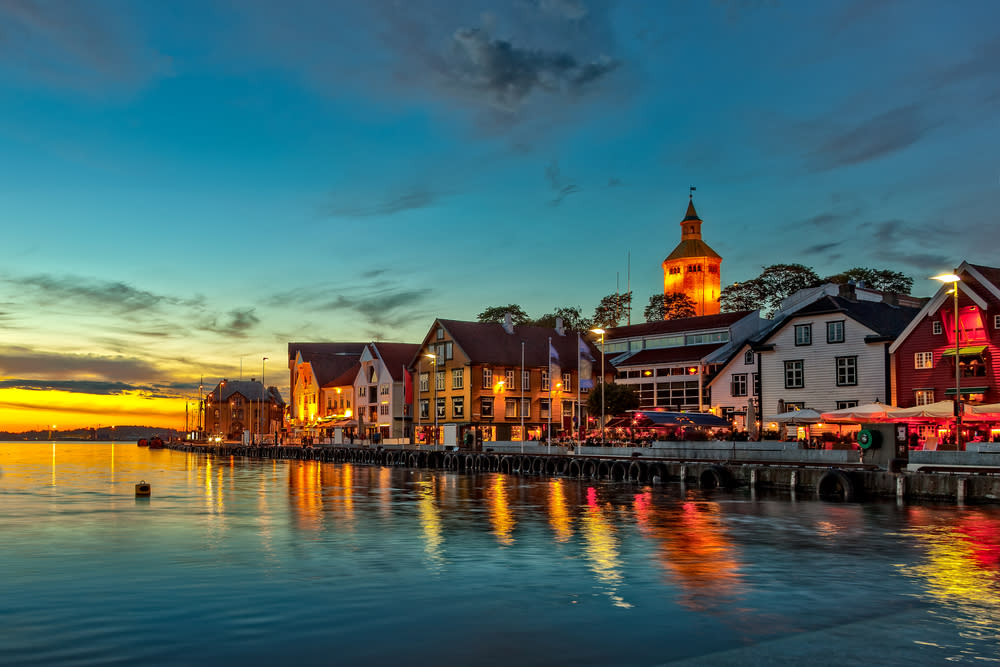More from Stavanger
Main Menu
- 00:00
- 06:00
- 12:00
- 18:00
- 23:00
Stavanger : Next 24-Hour Weather
Today - 4th November 2024
Sunrise 08:03
Sunset 16:37
Tomorrow - 5th November 2024
Sunrise 08:03
Sunset 16:37
Holiday Weather Now
Sorted by popularity:
Updated at 18:01 GMT
-
Temp feels like9°C48°F
-
Length of day08h 34m
-
Pressure30" (1028 hpa)
-
Visibility0 km (0miles)
-
Wind speed4 km/h
Sunrise 08:03
Sunset 16:37
-
Temp feels like:
9ºC (48 ºF)
-
Length of day:
08h 34m
-
Pressure:
30" (1028 hpa)
-
Visibility:
0 miles (0 km)
-
Wind speed:
4 km/h
Stavanger is the fourth largest city in Norway and is situated on the west coast towards the southern end of the country. It is a very wealthy city thanks to oil.
The climate of <?xml:namespace prefix = st1 />Stavanger is mainly determined by its northerly, coastal position and the warm Gulf Stream. It has a cool temperate maritime climate which means it has all four seasons but a small temperature range with very cool winters and mild summers. This is a contrast to the colder winters and warmer summers of inland areas.
The city is very wet and windy, especially in the autumn. Average rainfall is around 1200mm per year and the city sees rain or snow on more than 200 days per year.
Spring is pretty cold but often bright. It is the driest time of the year, with average rainfall about half that of autumn. May is the driest month seeing 39mm on average. However, it light rain falls very frequently. The average temperature climbs into the teens by late spring. It gets really cold at night; average lows start out at 0ºC in March donât get above 6ºC till the end of the season. It is possible to ski (the cross-country variety) right into May in the mountains near to Stavanger (about an hourâs drive). Sunshine levels are good, increasing to six hours per day by the end of the season.
Summers can be a bit of a mixed bag. When the sun comes out temperatures get into the low 20s. But rain falls regularly and on wet, windy, grey days the temperature can fall back into the mid teens. Rainfall increases in late summer; early summer sees lighter showers. Much like in England, summers vary from year to year and moment to moment conditions are erratic. July and August are the hottest months with average highs of 17ºC. However, heat waves have seen the temperature as high as 30ºC in July. There are many great beaches in the Stavanger area and surfing is popular, though never without a wetsuit as the water temperature peaks at 15ºC in August.
Autumn is very cool and wet. October is the wettest month in the year and sees 110mm of rain on average. Wet, windy days are the norm with 24 days seeing rain in October and 26 in November. Strong winds from the Atlantic batter the coast with huge storms, lashing the streets with driving rain. September can still see pleasant temperatures, but by late autumn it gets cold, with average temperature dropping to around 5ºC.
Winters in Stavanger are not necessarily what you would expect in Norway. Snow does not linger for long and it does not fall to far below freezing. This is due to the warming Gulf Stream. Only an hour inland, temperatures get significantly lower and snow settles in for months. Midwinter in Stavanger sees average temperatures hovering just above zero. January and February are the coldest months with average highs of 2ºC and average lows of -2 ºC. Rainfall is quite high too, at around 80mm per month. It is very windy and storms similar to those in autumn often develop.
<?xml:namespace prefix = o ns = "urn:schemas-microsoft-com:office:office" />

















